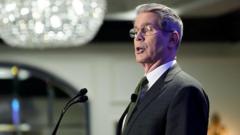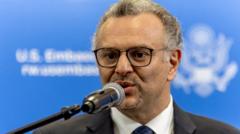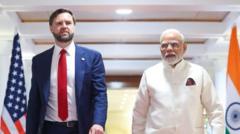In light of escalating trade tensions, US Treasury Secretary Scott Bessent suggests there is a significant opportunity for a trade agreement with China, contingent upon China's commitment to economic restructuring.
US Treasury Secretary Sees Potential for Major Trade Agreement with China

US Treasury Secretary Sees Potential for Major Trade Agreement with China
Scott Bessent emphasizes the importance of reducing dependency on exports in a potential US-China trade deal.
Scott Bessent, the US Treasury Secretary, has voiced optimism about the possibility of a significant trade agreement between the United States and China. In statements made during a gathering at the International Monetary Fund (IMF) conference, Bessent highlighted the necessity for China to reduce its reliance on manufacturing exports, positing that this shift is crucial for both nations.
According to Bessent, there exists an "incredible opportunity" for negotiation, particularly if China demonstrates a genuine willingness to adapt its economic strategy. "China needs to change. The country knows it must change. Everyone knows it must change," he remarked, indicating the importance of mutual economic rebalancing.
Bessent's comments come in a context marked by rising tensions from ongoing trade disputes between the two nations, where both have implemented substantial tariffs against each other. US President Donald Trump has introduced taxes as high as 145% on select Chinese imports, which has prompted China to retaliate with a 125% tariff on US goods.
In terms of prospects for peace, Bessent stressed that the current trade war situation is serious and not a trivial matter. He expressed confidence that China recognizes the urgency for change and reiterated the importance of a collaborative effort towards economic rebalancing, encompassing a shift from an export-led growth model to one focused on domestic consumption.
Furthermore, Bessent called for the IMF and World Bank to redirect their focus back to their fundamental objectives of fostering economic stability and development, criticizing their perceived drift into broader issues like climate change and social matters, which he argued are beyond their core mission.
ChinaTrade negotiationsGlobal economyUnited States





















